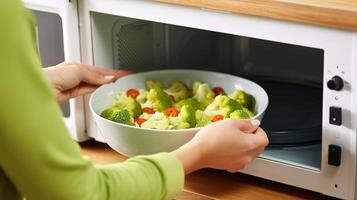The Truth About Nutrients and Microwave Cooking
When it comes to reheating meals or cooking quickly, microwaves are unbeatable in convenience. But many people ask the same question: Does microwaving food destroy nutrients? Some believe it zaps away all the goodness from your meals, while others argue it’s actually safer than traditional methods. So, what’s the truth?
Let’s dive deep into the science behind microwave cooking, how it affects nutrient retention, and whether your microwave is friend or foe to your health.
Understanding Nutrients and Cooking Methods
First, we need to understand what happens to food nutrients during any kind of cooking. Whether you’re boiling, steaming, frying, or microwaving, heat can cause nutrient loss, especially when it comes to heat-sensitive nutrients like vitamin C and certain B vitamins.
However, this loss depends on the cooking time, temperature, and method—not just the microwave itself.
How Does Microwave Cooking Work?
Microwaves heat food using electromagnetic waves that cause water molecules in the food to vibrate, producing heat. This heat then cooks the food from the inside out.
One of the key benefits of microwave ovens is that they cook food quickly and with less water, both of which are important factors when it comes to preserving vitamin retention and mineral preservation.
Does Microwaving Destroy Nutrients?
Here’s the short answer: Microwaving food does not destroy more nutrients than other cooking methods.
In fact, microwaving may actually help retain more nutrients than boiling or frying. Here’s why:
-
Shorter cooking time: Reduces exposure to heat.
-
Less water usage: Fewer water-soluble vitamins like vitamin C and B leach out.
-
Minimal nutrient breakdown: Compared to high-heat methods like grilling or frying.
Studies have shown that microwaving vegetables, for example, can retain more nutritional value than boiling them in water, where nutrients are often lost in the cooking water.
What Nutrients Are Most Affected by Microwaving?
Like all forms of cooking, microwaving can reduce certain nutrients, but it depends on the food and nutrient type. Here are a few examples:
-
Vitamin C: Sensitive to heat and water. Microwaving with minimal water helps retain more.
-
B vitamins (like B1 and B6): Can break down under heat but are better preserved when cooked quickly.
-
Antioxidants: Generally stable during microwave cooking compared to other methods.
If preserving food nutrients is your goal, microwaving is often a better choice than long, high-heat methods.
Best Tips for Nutrient Retention in Microwave Cooking
If you want to get the most nutrition out of your meals while using the microwave, try these tips:
1. Use Minimal Water
Avoid adding too much water when steaming or cooking vegetables. This helps reduce nutrient loss from leaching.
2. Cover Food
Covering food while microwaving helps retain steam and cook food more evenly, reducing the time needed and protecting heat-sensitive nutrients.
3. Don’t Overcook
Overcooking food—even in a microwave—can destroy important vitamins. Use short bursts and check frequently to avoid overheating.
4. Use Microwave-Safe Containers
Avoid plastic containers that aren’t microwave-safe, as they may release harmful chemicals. Stick to glass or ceramic to keep your food safe.
Microwave vs. Other Cooking Techniques
Let’s compare microwaving to other cooking techniques:
| Method | Nutrient Retention | Time | Water Use |
|---|---|---|---|
| Boiling | Low (water loss) | Medium | High |
| Steaming | High | Medium | Low |
| Frying | Low (heat damage) | Fast | None |
| Microwaving | Moderate–High | Very Fast | Very Low |
As you can see, microwaving food actually ranks better than boiling or frying in terms of nutritional value preservation.
Is Microwave Cooking Safe for Your Health?
Yes—microwave ovens are safe when used correctly. They don’t make your food radioactive or toxic. The electromagnetic waves only affect water molecules and stop once the microwave turns off.
There’s no evidence that microwaving alters food in harmful ways. In fact, because of the shorter cooking times, microwaving may reduce the formation of harmful compounds that sometimes appear with other methods, like burnt or charred food.
Final Verdict: Is Your Microwave a Friend or Foe?
So, does microwaving food destroy nutrients? The answer is no—at least not more than other cooking methods. In many cases, microwaving preserves more nutrients, especially when compared to boiling or frying.
If you’re looking for a fast, convenient, and effective way to cook while retaining nutrients, your microwave is not the enemy—it might just be one of the best tools in your kitchen.



